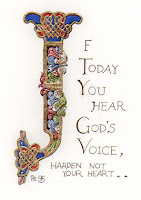One way to get to know what poverty means in St. Clair
County these days, is to sit for a morning in our District Court. I had to do that recently with a friend
facing traffic charges, and it is instructive.
As the 50 or so defendants in the general pews await the appearance of
the judge, there is a cordial shuffling in and out, of attorneys and court staff
at the frontal {beyond the bar} area. They
sit at tables and make last minute arrangements.
When the judge enters, the cases they handle proceed
expeditiously and with decorum. The 45
or so people left on the docket, those without lawyers, are next in line, given
more scrutiny, and though the same petty crimes are being considered for most, there
is a more severe disciplinary air in court.
Many have minor drug possession,
or suspended license, or violation of previous probation, level charges--and
most are unable to pay anything on the fines that are levied. The
judge remonstrates with them for not bringing money to court, and they
dissemble, and say that they will bring some when the date set by the judge
arrives.
There are a disproportionately large number of people of
color in the group that waits—and black or white, by the clothes they wear, and
the back-of-the-bus atmosphere surrounding the unrepresented, those without
money carry an extra burden well beyond their offenses.
There are so many ways our justice system discriminates
against the poor: racial profiling leading to arrest, unnecessary force during
arrest, lack of adequate legal representation, severe sentencing guidelines for
nonviolent crimes, incarceration awaiting trial because unable to make bail, doing
time in jail because of being unable to pay fines, …
nstead of the mock trials that are staged for our local
high school students to teach about our justice system, much better to have
them, in small unobtrusive groups, attend a morning’s court session. Our courtrooms are public, and there is no
better personal upfront instruction as to the good, and broken, elements of
justice in the USA today.
The widening gap between rich and poor in our country
puts us in danger of creating a permanent underclass, of the even greater
institutionalization of inequality.
Those with money are encouraged to demean those without. A major television studio now has a reality show that depicts the moral struggle of contestants, as to who needs $100,000
the most. A leading candidate to be our
next president has written a book with a chapter, “The Restoration of Shame,” in
which he says, “For many, it is more shameful to work than to take public
assistance—that is how backward shame has become!” Shame for those caught in a cycle of poverty,
but no shame for those caught in a cult of riches?
Robert Reich [former U.S. Secretary of Labor] on wealth & poverty in America
We live in the country whose idol is the “self-made man.” Responsibility and initiative are definitely
important. But it’s your fault if you’re
born into poverty? Yet eminently commendable
if you’re born into, or amass great wealth?
In an enlightening page of Bishop Ken Untener’s book [see below] of
Lenten reflections this past year, entitled “Poor can be overwhelmed into
inaction,” a day-in-the-life of the poor is compared to that of a regular
Joe. And there but for fortune go any
one of us.
The benign view of the rich: their trickle-down, will
lift all boats {without their need to pay any attention to the personal situation
of the poor}. The Last Judgement vision of Matthew 25 sees
it from the completely different perspective of a merciful all-loving God, “…when
you did it to the least of the brethren.”
The personal acts of mercy, for the ones we’re inclined to love the
least, are the path to heaven.
References
Interesting videos that touch on the
money and poverty questions –
Robert Reich – Inequality for All
Wall St. Journal approach
Ed Asner’s not-so-fractured fairy tale on the subject






No comments:
Post a Comment